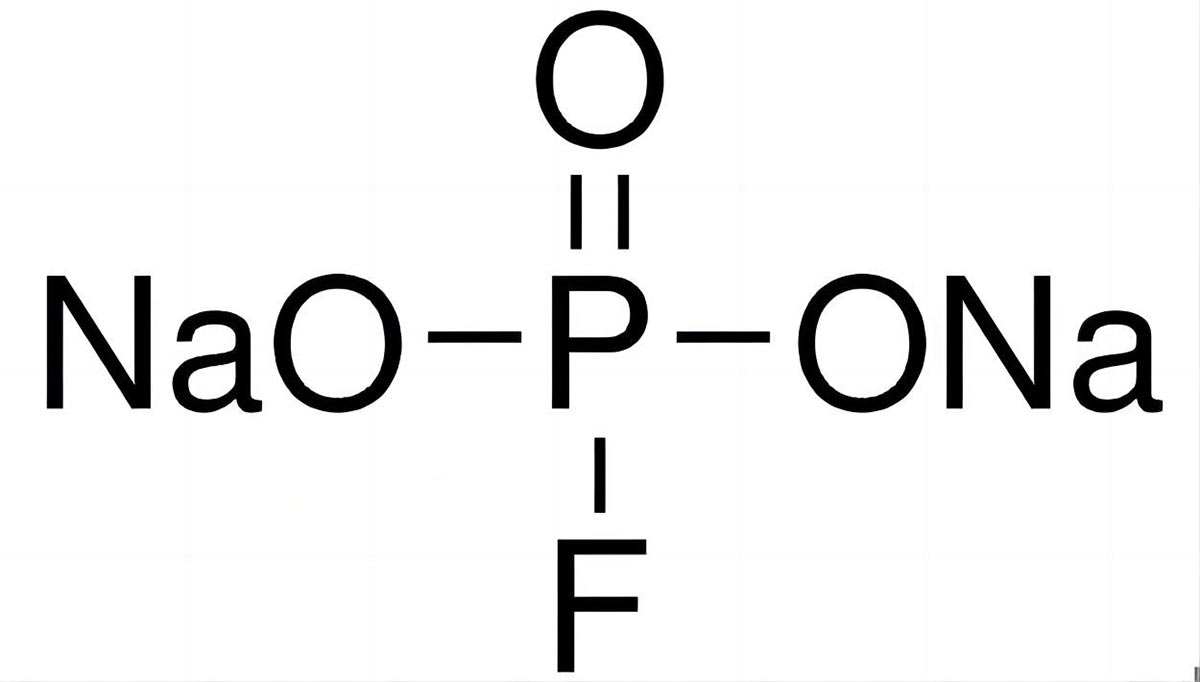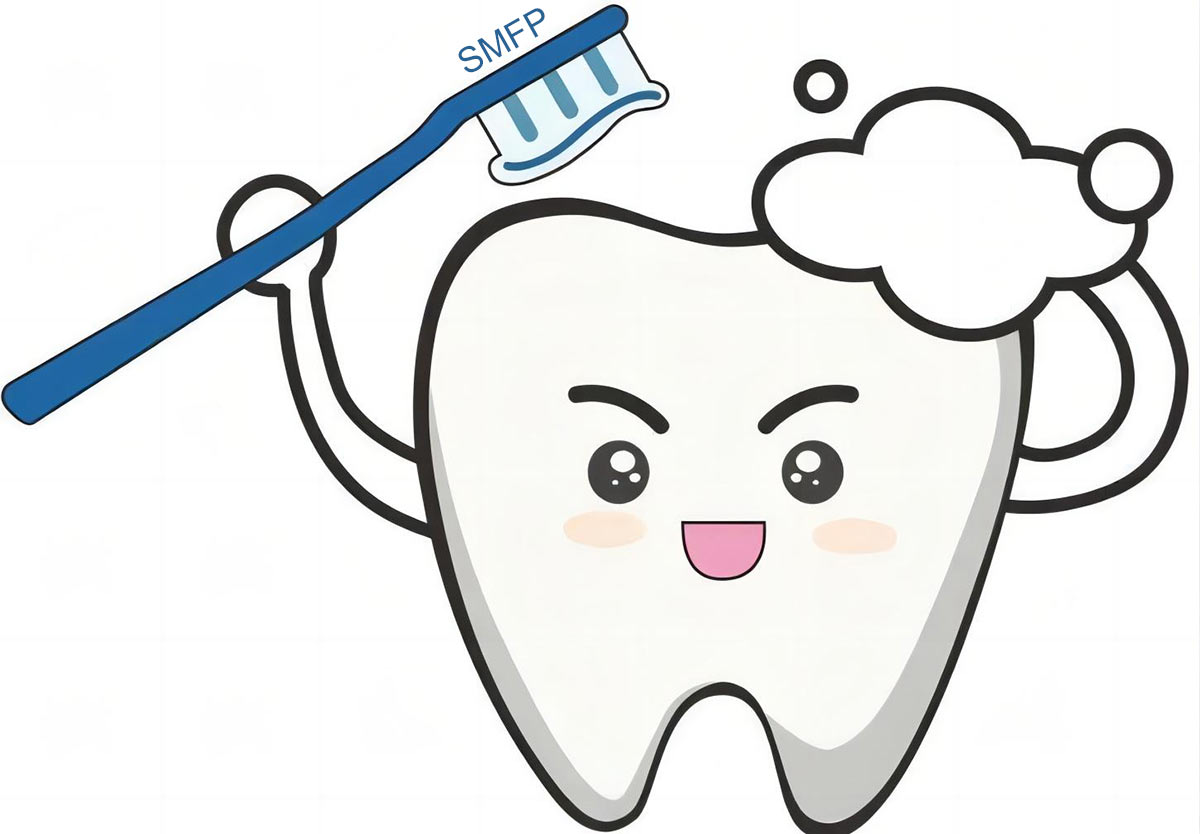What is Sodium Monofluorophosphate?
Монофторфосфат натрия is referred to as “SMFP” is a chemical substance, CAS 10163-15-2 white powder or white crystal, easily soluble in water, strong hygroscopic, at 25 degrees water dissolution is no side effects and no corrosion. Sodium monofluorophosphate contained in toothpaste is an excellent anti-caries agent and tooth desensitization agent. The conventional content of Sodium Monofluorophosphate in toothpaste is 0.7-0.8%, and the conventional content of fluorine in drinking water is 1.0mg/L. Sodium monofluorophosphate in aqueous solution has obvious bactericidal effect, and has obvious inhibitory effect on melanomycin, staphylococcus aureus, salmonella and so on. Sodium monofluorophosphate is widely used in toothpaste additives, concrete corrosion inhibitors, food, medical and other aspects.

Is sodium monofluorophosphate good for your teeth?
Sodium Monofluorophosphate is an inorganic compound used in toothpaste to prevent tooth decay and improve tooth sensitivity. The specific analysis is as follows:
Sodium Monofluorophosphate is widely used in fluoride toothpastes, which can promote tooth remineralization and prevent tooth decay. It has a good effect on people with sensitive teeth and will not irritate teeth after use. However, sodium monofluorophosphate has a certain toxicity, the content of sodium monofluorophosphate in toothpaste is 0.7%-0.8%, and generally a small amount of ingestion will not have any effect. If swallowed for a long time, it may lead to fluorosis, and may also cause tooth deformity, softening, loss of luster, etc., resulting in dental hypoplasia.

What are the risks of sodium monofluorophosphate?
Fluorine exists widely in nature and is one of the essential trace elements for human body, mainly accumulated in teeth and bones. Proper fluoride is necessary for the human body to maintain the normal development and calcification of teeth. The discovery that fluoride can prevent dental caries is arguably one of the greatest contributions of preventive oral medicine to mankind in the 20th century.
In short, fluoride ions can inhibit tooth demineralization, promote tooth mineralization, and enhance tooth resistance to acid; Fluoride also reduces the incidence of dental caries by affecting the metabolic activity of caries-causing bacteria. Therefore, moderate use of fluoride can effectively prevent tooth decay, which is the result of hundreds of clinical studies over decades. The commonly used fluoride in the mouth is sodium fluoride, sodium monofluorophosphate, stannous fluoride, etc., such as fluoride toothpaste, fluoride mouthwash, fluoride foam, etc.
The easiest and most common way to protect your teeth with fluoride is to brush your teeth twice a day with fluoride toothpaste. Many domestic and foreign authorities, such as the World Health Organization (WHO), the Chinese Dental Association have affirmed the role of fluoride toothpaste to prevent dental caries, but also clearly pointed out the safety and effectiveness of fluoride toothpaste.
What is the function of sodium monofluorophosphate?
Sodium Monofluorophosphate is widely used as toothpaste additive, concrete corrosion inhibitor, food, medical and so on.
SMFP is the most widely used toothpaste additive in the world, and is an excellent anti-caries agent and tooth desensitization agent, with a mass fraction of 0.7% to 0.8% in toothpaste. There are two main categories according to the ingredients: care toothpaste and biological toothpaste.
Nursing toothpaste: nursing toothpaste has the functions of preventing caries, desensitizing, anti-inflammatory and preventing tooth stones, etc. The grass coral total effect nursing toothpaste developed has this multi-effect function. The most important thing for the effective prevention and treatment of dental and periodontal diseases is to eliminate bacteria harmful to dental health in the mouth, and herbal extracts have been widely recognized in preventing and eliminating general inflammation of the gum and oral mucosa. The fluoride in Grass coral Total effect care toothpaste has the function of antibacterial and bactericidal. According to relevant studies, low concentration of fluoride ions (0.8% sodium monofluorophosphate in grass coral) has a better antibacterial effect. Fluoride is used as an additive to prevent caries. It not only has a health care effect on acid-resistant desensitization of teeth, but also acts with tooth enamel to form fluorapatite on the surface of tooth enamel, which improves the hardness of tooth enamel.

2) Biological toothpaste: Biological toothpaste is the addition of toothpaste to the biological body has a specific active function of the substance, the current biological toothpaste mainly contains enzyme preparations, antibody preparations and other biological active preparations. The toothpaste containing enzyme preparation mainly contains protease and glucanase. Proteolytic enzyme toothpaste can promote the rapid hydrolysis and break of the long chain of protein polypeptides, make the food residue attached to the tooth surface soft, easy to clean the mouth, and has the function of softening blood vessels, can make the inflammation and edema of the gum subside, and the phenomenon of tooth bleeding has been significantly improved or eliminated.
Glucanase helps remove tartar. Toothpaste containing antibody preparation is generally divided into: toothpaste containing milk antibody and toothpaste containing genetically modified preparation. Milk antibody toothpaste is to extract antibodies from milk, and it is added to the toothpaste to fight against a certain disease. The toothpaste containing transgenic antibody preparation is to add the product of human oral disease vaccine gene in the transgenic horse bell tuber into the toothpaste, which can produce the corresponding effect of preventing oral diseases. The fluorine in sodium monofluorophosphate is stable, and the fluorine in one year is maintained at 84.4%, which effectively ensures the caries prevention effect. Its pH value is 5.5 ~ 6.5, which is neutral. And good compatibility with abrasives, these advantages determine that sodium monofluorophosphate is very suitable for toothpaste additives, has been in mass production in China. The anti-caries effect of fluoride toothpaste was observed in Beijing Stomatology Science Center for two and a half years, and the caries decreased by 42.95%.
2. Application in food
1) SMFP used as a food additive: From long-term clinical trials, it is known that sodium monofluorophosphate is better than other common fluoride raw materials (such as sodium fluoride) as a source of fluorine. Sodium monofluorophosphate can be used as a food additive to increase food nutrition, but if it exceeds the standard, it is unsafe. Sodium monofluorophosphate is added to foods, and 0.25 to 5mg of fluorine can be added every day, which is equivalent to the intake of 2.5 to 16mg sodium monofluorophosphate. According to the data, it is not safe to consume sodium fluoride (1.7 to 14mg) and phosphate (1.1 to 8.8mg) every day. In Europe, the amount of additives in food is generally below the maximum limit. For adults, eating 2mg of fluorine-containing food per day will not exceed the standard. Therefore, we should pay attention to the safety of sodium monofluorophosphate while enhancing the nutritional value of food.
2) SMFP used as chewing gum material: Chewing gum has always been favored by the public. But the current chewing gum does not have caries prevention, desensitization, bacteriostasis, anti-cold and other health functions. Although the average medicated toothpaste has one or more effects, it cannot replace the chewing function and taste of chewing gum. In 1998, Li Guohua developed a chewing gum with multiple effects, which added 0.5% sodium monofluorophosphate, so it has a good anti-caries effect.

3. Medical applications
1) SMFP used to regulate menopause: female lipid and lipoprotein metabolism Sodium monofluorophosphate can be used to regulate lipid and lipoprotein metabolism in postmenopausal women.
2) SMFP used to increase bone mass and alleviate osteoporosis: Sodium monofluorophosphate promotes osteoblast differentiation and diffusion while promoting bone mass increase, which is caused by fluorine inhibiting growth factors in acid phosphatase. MFP can perform its function through other signaling mechanisms. Although sodium fluoride also has the function of increasing bone mass, MFP increases bone mass more when consuming equal amounts of MFP and NaF. Sodium monofluorophosphate can increase bone mass and relieve osteoporosis, but it does not change the mineralization of bone tissue.

4. Used as a corrosion inhibitor:
When steel bars corrode, a series of protection and repair methods can strengthen the structure of concrete, and corrosion inhibitors are the most attractive alternatives. MFP as a rust inhibitor can slow down the corrosion of rebar.